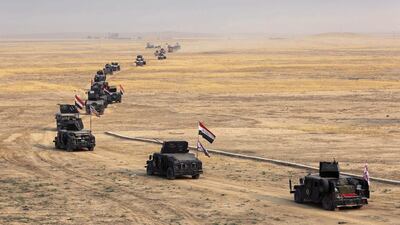A meeting of several western and Middle Eastern countries was held in Paris last Thursday to discuss ways to restore peace and stability to the Iraqi city of Mosul after its liberation from ISIL.
Writing in the pan-Arab daily Al-Arab, the columnist Hamed Al Kilani said among those in attendance was Iraqi foreign minister Ibrahim Al Jaafari, who is also a member of Iraq's ruling party Al Dawa and the official sponsor of the Popular Mobilisation, an umbrella of 40 militia groups. Mr Al Jaafari gave his reassurance that the Popular Mobilisation should not be of concern to Iraq and the Iraqi people.
Al Kilani wrote: “Mr Al Jaafari explained that it is part of the army that answers to the commander-in-chief of the armed forces, prime minister Haider Al Abadi, yet another member of Al Dawa.”
The writer noted that the main reason behind the Paris meeting – the reconstruction of Mosul – was only discussed in brief because the technical and financial aspects had been prepared beforehand.
“Most of the discussion rotated around the concern expressed by the international community vis-à-vis the Popular Mobilisation’s participation in the battle of Mosul.”
The concern is rooted in reports by human rights organisations of violations by members of these militias. It is corroborated by the outcry of the people of Nineveh whose residential neighbourhoods are being randomly attacked by Popular Mobilisation militias located at the borders of Mosul, the writer said.
“Mr Al Abadi talks about protecting human rights in the battle of Mosul, while Mr Al Jaafari offers guarantees on behalf of his party and the Revolutionary Guards led by Qasem Al Soleimani,” Al Kilani wrote.
“He confidently pledged that neither his government nor his political regime nor his party bear any relation to the sectarianism, quotas, displacement, destruction, insults, humiliation and kill lists, not to mention the dispatching of militias and the recruitment of children to fight alongside the ruling regime in Syria or the purge in Iraq.”
According to the editor-in-chief of Asharq Al Awsat, Salman Aldossary, Iraqi forces' tanks shown in the media raising sectarian slogans while progressing to Mosul reveal the dark truth of an image meant to be flagrantly embellished.
“At a time when the world is joining forces to oust ISIL from its Iraqi stronghold, sectarian militias are indirectly being shoved into the city, as if innocent civilians are destined to fall prey to ISIL and the Popular Mobilisation and to suffer the same atrocious violations as their counterparts in Fallujah, Tikrit and Ramadi,” he said.
“ISIL will clearly be routed from its last haven in Iraq, and its power to occupy cities will wane. It will gradually turn into one of those terrorist groups that have afflicted the region and will continue to practise terrorism secretly and openly,” he wrote.
However, the dilemma does not reside in the war waged against a few thousand ISIL members whose defeat is foreseen.
“The actual problem will appear following the liberation of Mosul in light of the sectarianism that [former prime minister] Nouri Al Maliki has passed on to his successor, Haider Al Abadi, and that is now out of the Iraqi government’s control.”
Al Dossary said that all these fears forebode a humanitarian crisis for civilians in Mosul and raise concerns among the international community, as clearly reflected at the Paris meeting.
He concluded that such meetings will not have any positive outcomes as long as the militias are in control on the ground.
“Nonetheless, they serve to acknowledge that the problem is not limited to ousting ISIL but extends to the aftermath of the liberation of the city,” the writer said.
* Translated by Jennifer Attieh
translation@thenational.ae

